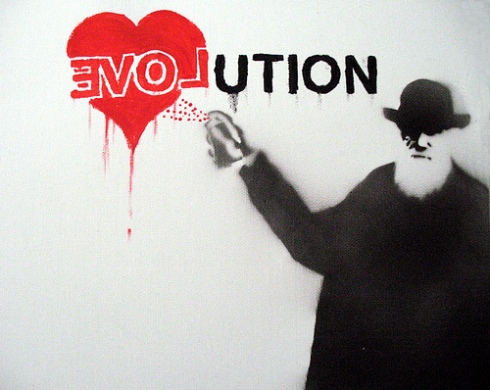You are currently browsing the tag archive for the ‘Evolutionary Theory’ tag.
Darwin by Peter Greenaway (1993) – Although British director Peter Greenaway is best known for feature films like The Cook, the Thief, His Wife and Her Lover, Prospero’s Books, and The Pillow Book, he has also completed several highly respected projects for television, including this 53-minute exploration (now free) of the life and work of Charles Darwin. Darwin is structured around 18 separate tableaux, each focusing on another chapter in the naturalist’s life, and each consisting of just one long uninterrupted shot. Other than the narrator’s voice-over, there is no dialogue.
Drawing (Pedigree of Man, 1879) – Ernst Haeckel‘s “tree of life”, Darwin‘s metaphorical description of the pattern of universal common descent made literal by his greatest popularizer in the German scientific world. This is the English version of Ernst Haeckel‘s tree from the The Evolution of Man (published 1879), one of several depictions of a tree of life by Haeckel. “Man” is at the crown of the tree; for Haeckel, as for many early evolutionists, humans were considered the pinnacle of evolution.
 EVOL-ution Stencil Art work by KrieBeL (source on flickr)
EVOL-ution Stencil Art work by KrieBeL (source on flickr)
“It is not the strongest of the species that survives, nor the most intelligent that survives. It is the one that is the most adaptable to change“. Charles Darwin (On the Origin of Species, Nov. 1859)
At his final chapter Charles Darwin (On the Origin of Species, Nov. 1859) reviews points from earlier chapters, and he concludes by hoping that his theory might produce revolutionary changes in many fields of natural history. Although he avoids the controversial topic of human origins in the rest of the book so as not to prejudice readers against his theory, here he ventures a cautious hint that psychology would be put on a new foundation and that “Light will be thrown on the origin of man“. Darwin ends with a passage that became well known and much quoted:
[…] It is interesting to contemplate an entangled bank, clothed with many plants of many kinds, with birds singing on the bushes, with various insects flitting about, and with worms crawling through the damp earth, and to reflect that these elaborately constructed forms, so different from each other, and dependent on each other in so complex a manner, have all been produced by laws acting around us … Thus, from the war of nature, from famine and death, the most exalted object which we are capable of conceiving, namely, the production of the higher animals, directly follows. There is grandeur in this view of life, with its several powers, having been originally breathed into a few forms or into one; and that, whilst this planet has gone cycling on according to the fixed law of gravity, from so simple a beginning endless forms most beautiful and most wonderful have been, and are being, evolved […]. Charles Darwin, On the Origin of Species by Means of Natural Selection, or the Preservation of Favoured Races in the Struggle for Life, Nov. 1859. [passage from darwin-online.org.uk ]
 Fig. – The famous frontispiece from Scilla’s treatise of 1670 defending the organic nature of fossils. The solid young man, representing the truth of sensory experience, shows a fossil sea urchin in his right hand to a wraithlike figure representing the former style of speculative thinking. With his left hand, the solid figure points to other fossils found in Sicily. The text proclaims: “Vain speculation undeceived by the senses.” (from, Stephen Jay Gould, “The Structure Of Evolutionary Theory”, The Belknap Press of Harvard University Press”, Cambridge, Massachusetts, 2002).
Fig. – The famous frontispiece from Scilla’s treatise of 1670 defending the organic nature of fossils. The solid young man, representing the truth of sensory experience, shows a fossil sea urchin in his right hand to a wraithlike figure representing the former style of speculative thinking. With his left hand, the solid figure points to other fossils found in Sicily. The text proclaims: “Vain speculation undeceived by the senses.” (from, Stephen Jay Gould, “The Structure Of Evolutionary Theory”, The Belknap Press of Harvard University Press”, Cambridge, Massachusetts, 2002).
Exaptation: 1. The use of a biological structure or function for a purpose other than that for which it initially evolved. 2. An evolutionary process in which a given adaptation is first naturally selected for, and subsequently used by the organism for something other than its original, intended purpose. 3. Exaptations – Features (such as feathers) that evolved by selection for one purpose (such as warmth) and were later adapted to a new purpose (such as flight). [more]. Exaptive: to show exaptation – featuring it.





Recent Comments